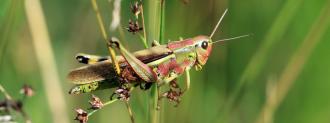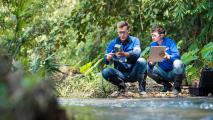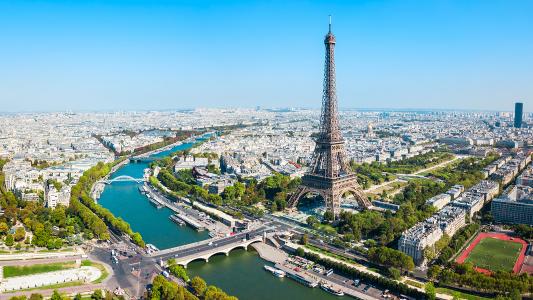Armed with harvested eggs, a hot light bulb, and a glass tank, citizen keepers in England are raising large marsh grasshoppers, once on the verge of extinction, to re-introduce them into their newly restored habitats.
Their efforts are part of a project spearheaded by U.K. nonprofit Citizen Zoo, which aims to involve everyday people in rewilding — putting endangered captive animals back into their native habitats.
“We came up with this citizen keeper concept, which is basically normal people being zookeepers in their own homes, breeding and rearing grasshoppers,” Citizen Zoo CEO Lucas Ruzo told WIRED UK.
“It’s as simple as a light bulb and then a jar of fresh grass every morning.”
Large marsh grasshoppers, their chartreuse bodies splashed with raspberry pink, once roamed the wetlands of Eastern England.
Return of the hoppers: Large marsh grasshoppers, their chartreuse bodies splashed with raspberry pink, once roamed the wetlands of Eastern England. Habitat destruction has left populations locally extinct, WIRED UK reported, with pockets only holding out in various fens, valleys, and bogs. (All of which sound like extremely British habitats.)
They likely risk becoming extinct across the entire U.K., ecologist Lloyd Park told the BBC.
But the handsome hoppers are also prime candidates for rewilding, Ruzo believes.
“Because of habitat fragmentation and climate change, it’s likely to go extinct in the next 25 years if we don’t do anything,” Ruzo told The Guardian. “A lot of sites where it once was have now been restored so it’s a really good candidate for reintroduction.”
That includes Wild Ken Hill, located in Snettisham, near King’s Lynn, where grasshoppers raised by citizen keepers were reintroduced this past September.
“The way we manage wetter areas here at Ken Hill should provide them with everything they need to become an established important part of the site’s ecology,” Park told the Eastern Daily Press.
Around a hundred hoppers were set free to fly and eat in their new, old home.
“Because of habitat fragmentation and climate change, it’s likely to go extinct in the next 25 years if we don’t do anything.”
Lucas Ruzo
Raising citizen keepers: Ruzo began Citizen Zoo in 2016, WIRED reported, while studying for his master’s in conservation at Imperial College London (ICL).
Seeing that other wildlife charities were not fully bought into the idea of rewilding, Ruzo launched Citizen Zoo to not only become a leading voice in rewilding efforts, but to democratize the process. He believes in getting people directly involved in conservation in their own backyard — the holocene extinction isn’t something happening far away.
Citizen keepers — who include retirees, students, and working adults — are given eggs harvested from large marsh grasshoppers. Feeding them fresh grass every day, the citizen keepers can raise a brood of hoppers every four to five weeks. Citizen keepers are also trained in biosecurity, The Guardian reported. Pets need to be free of potentially harmful flea-killer treatments, for example, and commingling the grasshoppers with exotic animals — and risking infection — is a no-no.
“It has been easier than I expected but in the later stages they eat a lot and you’re going out daily to get fresh cock’s-foot grass for them,” volunteer Mark Welch told The Guardian. A retired mineralogist, Welch’s 100 nymphs are raised beneath the glowing warmth of a heat lamp in his Cambridgeshire home.
“When the adults start appearing, the males make this ticking noise, flicking their wings rather than rubbing it. They are charismatic things and it’s nice to handle them and let them sit on your finger,” Welch said. “It is exciting to be part of putting them back into a place where they’ve been extinct for 50 years and it’s gratifying to feel that you’re making a small contribution.”
That excitement is key to why citizen keepers may play a pivotal role in rewilding; first, Ruzo told WIRED, we need to rewild humans.
“I think the coolest thing about this citizen keeper thing is that it’s shifted the perspective of what people can do and can support,” he said. Restoring grasshopper populations may help inspire changes in behavior and perspective in citizen keepers and others.
“That’s, at least, the hope.”
Raised by volunteers with heat lamps and cups of fresh grass, the hoppers are being reintroduced into their new, old homes.
Wild London: Citizen Zoo’s mission is about to take a big, well, leap, beyond grasshoppers. The nonprofit’s mission extends to rewilding beavers and voles, and has gotten a boost from a powerful source: London mayor Sadiq Khan.
Khan recently announced an investment of £600,000 in efforts to rewild animals to London’s natural habitats and bring nature to its citizens.
“From green rooftops to pocket parks, nest boxes for peregrines and swifts, rewiggling streams and reintroducing long lost native species, our plan is to weave wild nature back through the very fabric of our city,” Ben Goldsmith, of the Department for Environment, Food and Rural Affairs, told The Guardian.
Citizen Zoo will be part of the efforts to reintroduce their grasshoppers, too.
The small, striking insects were a perfect species for citizen keepers. Already released across East England, the little beasties should have begun the process of re-establishing themselves across their freshly-revived range, a hopping hope that England can restore some of its natural self.
We’d love to hear from you! If you have a comment about this article or if you have a tip for a future Freethink story, please email us at [email protected].






